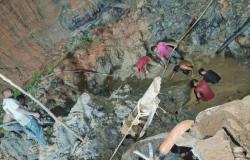
On Tuesday, around 5:30 p.m., he received the call. Hours before, José Carlos Orga, born in Zaragoza (1967) but settled in La Rioja for 20 years, already suspected that the two majority parties in the country had reached an agreement to unblock the renewal … of the General Council of the Judiciary (CGPJ). The Institutional Deputy Secretary of the PP, Esteban González Pons, and the Minister of the Presidency, Justice and Relations with the Cortes, Félix Bolaños, met in Brussels. A scenario that suggested “almost certainly,” he says, that the announcement was imminent.
– First of all, congratulations. Was the agreement expected?
– It was deeply desirable that after no more and no less than five years the renewal of the CGPJ would be unblocked. The shame is that it took so long.
– Do you understand the blockade to which the Council has been subjected?
– It is an anomalous, undesirable situation and has had negative consequences for the functioning of Justice in our country. Going into considerations of whether I understand or do not understand, is a question of the time it has taken the political forces to reach an agreement.
– To reach this pact, EU mediation has been necessary.
– Everyone will have their opinion on whether that is positive or whether it should not have gotten there. In any case, the fundamental thing is the result, that a consensus solution has finally been reached between the two majority political forces in our country. Now the important thing is to look ahead, the task we have and the responsibility we must assume. Spanish society is expecting us to get to work as soon as possible and adopt the most urgent measures so that the functioning of the Administration of Justice can be normalized, especially in terms of appointments.
– The agreement has not satisfied the extremes and even some association of judges. Independent Judicial Forum has criticized that it does not eliminate the politicization of justice but rather seems aimed at perpetuating it.
– In the case of the judicial associations, we are all aware of the position of each one of them regarding the Council appointment system, but that is a matter that will be entrusted to us in the next six months, once we take office. We will have to draw up a proposal, which we must aim to be as consensual and as acceptable as possible, so that another system of renewal can be reached, which, of course, must avoid the repetition of situations of stagnation or delay as on this occasion.
EU MEDIATION
“Everyone will have their opinion on whether that is positive or whether it should not have gotten there.”
– Along the lines of the judges choosing the judges?
– First you have to land on the Council. It will be an issue that we will have to deliberate, address and enrich the debate with everyone’s opinions. I am never a fan of going into a deliberation with a predetermined position. Obviously, both the position of the EU and of the Professional Association of the Judiciary (APM), which endorsed my candidacy, has always been known: we are in favor of the judges electing the twelve judicial members.
– It will also be approved that those who have held political office in the last five years cannot access the position of members or that of State Attorney General. It is about avoiding cases like, for example, that of Dolores Delgado.
– You propose what is known as revolving doors. I believe that it is a concept that has received little criticism against it.
– And now that?
– I understand that in July we will take office as members, there will have to be a session in the Cortes Generales and as far as La Rioja is concerned I will have to cease my position in the Provincial Court, I will enter a situation of special services in the CGPJ. What I want is to convey the regret that it gives me to stop working in the Court in which I have been very comfortable these years. In addition, we have had to take on cases such as presiding over the jury of what is journalistically known as the plunger case and the professor case, which have been very enriching experiences.
– Has the paralysis affected the citizen?
– Absolutely. The functioning of the Judiciary is basic to our rule of law. If the Supreme Court and the superior courts of justice have fewer members than their corresponding number, it will have an impact on a Justice Administration whose greatest deficit is the delay due to insufficient personal means. .
– When he was under investigation, some of his cases raised some controversy, such as that of the chalet of former Rioja president Pedro Sanz.
– I am not aware that the case has ended, so I cannot and should not make any statement about a case that is not finalized and in which I participated in the investigation.





